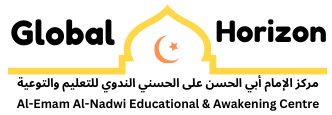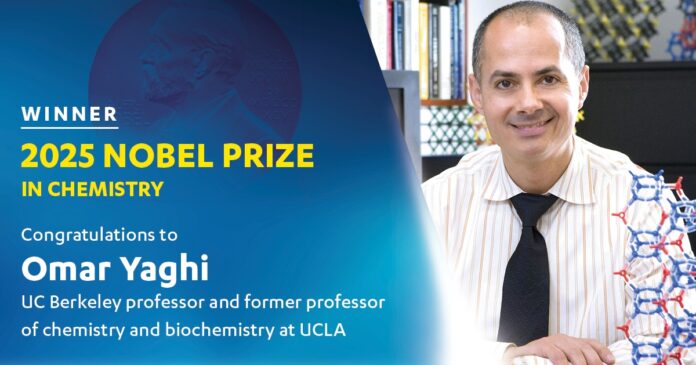In a single cramped room in Amman, Jordan, amid the poverty of a Palestinian refugee camp, a young boy shared his space with nine siblings and the family’s livestock. There was no electricity to light the darkness, no running water except for a few precious hours each week when a valve would open, requiring someone to wake before dawn to collect every drop. His father’s education had ended after sixth grade; his mother could neither read nor write. Yet from this humble beginning emerged one of the greatest scientists of our time—Professor Omar Yaghi, winner of the 2025 Nobel Prize in Chemistry.
Born on February 9, 1965, to a Palestinian family that had fled their village of Al-Masmiyya in Gaza during the catastrophic events of 1948, Omar Mwannes Yaghi inherited a legacy of displacement and hardship. The family’s migration to Jordan was part of a larger exodus that saw hundreds of thousands of Palestinians forced from their ancestral homes. They settled in Amman’s refugee quarters, where survival itself was a daily challenge and water scarcity defined their existence.
“I grew up in a refugee family. I walked three miles every day to school, back and forth. I had hardship,” Yaghi would later recall. Those six-mile daily journeys on foot were not merely commutes but acts of determination, each step a testament to his parents’ unwavering belief that education was the key to lifting their children out of poverty. Despite having virtually no formal education themselves, Yaghi’s parents dedicated every minute of their time to their children’s schooling, understanding that knowledge was the only inheritance they could truly provide.
The deprivation of those early years left an indelible mark on young Omar. The anxiety of watching water trickle from a valve for only a few hours weekly, the necessity of calculating every precious drop, would decades later inspire one of his most remarkable innovations—technology to harvest water from desert air. “You had to think of every drop of water back then, because it was really precious,” he remembered. Little did he know that this childhood scarcity would one day drive scientific breakthroughs offering solutions to global water crises.
At fifteen, Omar Yaghi’s life took a dramatic turn when his father encouraged him to seek opportunity in the United States. Arriving in America with minimal English language skills, he embodied the immigrant dream—disadvantaged, uncertain, but determined. He enrolled at Hudson Valley Community College, starting from the foundation many would consider beneath someone destined for greatness. But Yaghi understood that every step mattered, and he transferred to the State University of New York at Albany, where he completed his undergraduate degree before pursuing doctoral studies at the University of Illinois at Urbana-Champaign.
This recognition is really a testament of the power of the public school system in the U.S. that takes people like me with a major disadvantaged background, a refugee background, and allows you to work, and work hard, and distinguish yourself,” Yaghi said upon receiving the Nobel Prize. His gratitude for America’s public education system reflected a profound understanding that opportunity, when paired with dedication, can transform lives regardless of origin.
Yet Yaghi’s remarkable journey found crucial support from an unexpected quarter—the Kingdom of Saudi Arabia. In 2021, recognizing his extraordinary scientific achievements and contributions to reticular chemistry and nanomaterials, Saudi Arabia granted Yaghi citizenship by royal decree. This was not merely honorary recognition but a strategic alignment with Saudi Vision 2030, the Kingdom’s ambitious plan to foster an environment attracting exceptional global talent in fields vital to technological and scientific advancement.
The Saudi support proved transformative. Yaghi became co-director of the King Abdulaziz City for Science and Technology (KACST)–UC Berkeley Center of Excellence for Nanomaterials for Clean Energy Applications, a partnership that provided sustained institutional backing for his ground-breaking research. He also serves as an advisor to the KACST president and as a board member of the Research, Development and Innovation Authority. This long-term collaboration between Berkeley and Saudi institutions created the infrastructure necessary for Yaghi’s increasingly ambitious projects.
When the 2025 Nobel Prize in Chemistry was announced on October 8, Professor Yaghi expressed deep gratitude to Crown Prince Mohammed bin Salman for his continuous encouragement, describing the support as playing a “pivotal role” in achieving this historic milestone. “Receiving this award is a great honor for me and for all Saudi and Arab scientists around the world,” Yaghi stated, according to the Saudi Press Agency. “I hope this achievement will inspire the next generation of Saudi and Arab youth to pursue excellence in research and innovation.
Dr. Munir Eldesouki, president of KACST, reflected on the significance: “Dr. Yaghi’s Nobel win reflects the wise leadership’s vision of making the Kingdom a global hub for science, knowledge, and innovation. It confirms that investing in creative minds is the path to building a sustainable future for humanity”.
Yaghi shares the 2025 Nobel Prize with Susumu Kitagawa of Kyoto University and Richard Robson of the University of Melbourne for developing metal-organic frameworks (MOFs), revolutionary materials described by one Nobel committee member as resembling Hermione Granger’s enchanted handbag from Harry Potter—small on the outside but vast within. These frameworks can harvest water from desert air, capture carbon dioxide, store toxic gases, and catalyze chemical reactions. The applications directly address some of humanity’s most pressing challenges: climate change, water scarcity, and clean energy storage.
Yaghi’s water-harvesting technology particularly resonates with his personal history. The boy who once woke before dawn to collect precious drops of water has now created materials capable of extracting moisture from the driest desert air—a poetic circularity that transforms childhood trauma into global solution.
As the first Saudi national to win a Nobel Prize, Yaghi represents multiple identities—Palestinian by heritage, Jordanian by birth, American by education and professional development, and Saudi by recognition and partnership. His story demonstrates that scientific excellence transcends borders and that strategic investment in brilliant minds yields returns that benefit all humanity.
From that crowded room in Amman where a refugee child dreamed of possibilities beyond livestock and water scarcity, to the prestigious stages of Stockholm where Nobel laureates receive humanity’s highest scientific honor, Omar Yaghi’s journey embodies hope, perseverance, and the transformative power of education supported by visionary leadership. His innovations will likely benefit billions, proving that the greatest scientific breakthroughs often emerge from those who have personally experienced the problems they dedicate their lives to solving.
Ahmad Suhaib Siddiqui Nadvi
Email: al.emam.education@gmail.com
Global Horizon
Al-Emam Al-Nadwi Education & Awakening Center



